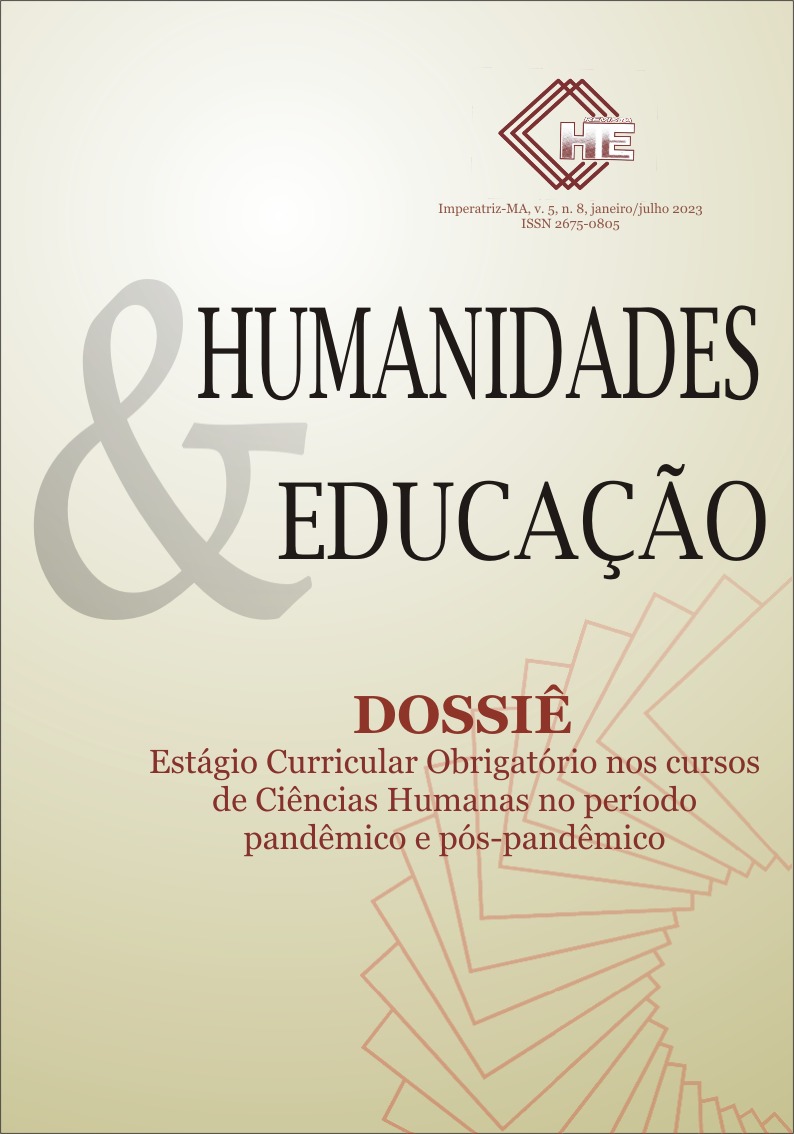MANDATORY CURRICULAR INTERNSHIP IN SCHOOL MANAGEMENT IN A PEDAGOGY GRADUATION
the production of an educational experience
DOI:
https://doi.org/10.18764/2675-0805v5n8.2023.6Keywords:
Mandatory curricular internship, School management, Learning, Educational ExperiencesAbstract
The present report brings a powerful educational experience through the completion of the Compulsory Curricular Internship in School Management, promoted by a graduation course in Pedagogy from a Federal Institution in the South of Brazil. After a survey carried out with the teachers of the public school where the internship took place, the demand for an internship project about learning was verified, which is one of the central themes of current education, including the Common National Curricular Base (2018). The actions were based on the development of a fiveweek inservice training program for the thirtytwo teachers at the school, who work in kindergarten and elementary school. The promoted activities took place weekly and relied on different pedagogical strategies to reach and mobilize teachers, such as the creation of an Instagram profile (@aprendiz.agem), weekly coffees with teachers, and a final feedback meeting to deliver the developed educational product: a workbook that compiled all the content provided in the formational journey. As final considerations, we point out that the School Management field is very challenging, however, the insertion in this scenario during the initial formation allows the students a differentiated formative itinerary, rich with experiences and possibilities, which brings an atmosphere of renewal for the school teachers while promotes to the trainees what we defend as cotraining that produces a powerful educational experience.
Downloads
References
BAHIA. S. B. D. M. H.; FABRIS, E. T. H.; A constituição do professor iniciante: articulação entre ética da partilha e experiência coformativa. Revista Textura – Ulbra, v. 23, n. 53, p. 192-215, 2021. Disponível em http://www.periodicos.ulbra.br/index.php/txra/article/view/5806 . Acesso em: 08 jan. 2023.
BRASIL. Presidência da República. Lei nº 9.394, de 20 de dezembro de 1996 - Estabelece as diretrizes e bases da educação nacional. Brasília/DF, 1996.
BRASIL. Ministério da Educação. Base Nacional Comum Curricular. Brasília/DF, 2018.
BRASIL, Conselho Nacional de Educação. Resolução CNE/CP Nº 2, de 20 de dezembro de 2019: Define as Diretrizes Curriculares Nacionais para a Formação Inicial de Professores para a Educação Básica e institui a Base Nacional Comum para a Formação Inicial de Professores da Educação Básica. Brasília/DF 2019.
DEWEY, J. Experiência e educação. São Paulo: Nacional, 1971.
DEWEY, J. A arte como experiência. São Paulo: Martins Fontes, 2010.
GRAMSCI, A. Os Intelectuais e a organização da cultura. Rio de Janeiro: Editora Civilização Brasileira S.A, 1982.
IFRS. Regulamento Geral de Estágio Curricular do curso de Licenciatura em Pedagogia, 2019.
LIMA, Samantha Dias de (Org.). Laboratório Pedagógico de Experiências
Educativas (ano 2) articulando saberes LABPED e ESCOLA na formação de
professores. Estância Velha: Z Multi Editora, 2023.
LIMA, Samantha Dias de (Org.). Vocabulário LABPED: saberes construídos no Laboratório Pedagógico de Experiências Educativas – Ano 1.São Paulo: Pimenta Cultural, 2022.
PARO, V. H. Gestão democrática da escola pública. 2ª ed. São Paulo: Ática, 1998.
PIMENTA, S. G. (Org). Saberes pedagógicos e atividade docente. 8º ed. São Paulo: Cortez Editora, 2018.
SACRISTÁN, J. G. Consciência e ação sobre a prática como libertação profissional dos professores. In: NÓVOA, A. Profissão Professor. Porto: Editora Porto, 1999.
TARDIF, M. Saberes docentes e formação profissional. Petrópolis: Vozes, 2014.
VEIGA-NETO, A.; LOPES, M. C. Para pensar de outros modos a modernidade pedagógica. ETD –Educação Temática Digital, 12, p.147-166, 2010. Disponível em: http://nbn-resolving.de/urn:nbn:de:0168-ssoar-212264. Acesso em: 2 jan. 2023.










